This is the multi-page printable view of this section. Click here to print.
CentOS
Learn how to install and configure CentOS linux
1 - CentOS-8
Learn about CentOS release 8
Extra Packages for Enterprise Linux (EPEL)
Extra Packages for Enterprise Linux (EPEL) is a special interest group (SIG) from the Fedora Project that provides a set of additional packages for RHEL (and CentOS, and others) from the Fedora sources.
Note
EPEL is not an official part of the RHEL subscription or an official offering from Red Hat. But it can come in handy for admins and developers who work with RHEL and need a few utilities packaged for RHEL from a source they can feel good about.dnf -y install epel-release
dnf update -y
[root@192 ~]# dnf install epel-release
Last metadata expiration check: 1:50:34 ago on Fri 17 Jul 2020 11:34:52 AM CEST.
Dependencies resolved.
================================================================================================================
Package Architecture Version Repository Size
================================================================================================================
Installing:
epel-release noarch 8-8.el8 extras 23 k
Transaction Summary
================================================================================================================
Install 1 Package
Total download size: 23 k
Installed size: 32 k
Is this ok [y/N]: y
Downloading Packages:
epel-release-8-8.el8.noarch.rpm 98 kB/s | 23 kB 00:00
----------------------------------------------------------------------------------------------------------------
Total 71 kB/s | 23 kB 00:00
warning: /var/cache/dnf/extras-2770d521ba03e231/packages/epel-release-8-8.el8.noarch.rpm: Header V3 RSA/SHA256 Signature, key ID 8483c65d: NOKEY
CentOS-8 - Extras 1.6 MB/s | 1.6 kB 00:00
Importing GPG key 0x8483C65D:
Userid : "CentOS (CentOS Official Signing Key) <security@centos.org>"
Fingerprint: 99DB 70FA E1D7 CE22 7FB6 4882 05B5 55B3 8483 C65D
From : /etc/pki/rpm-gpg/RPM-GPG-KEY-centosofficial
Is this ok [y/N]: y
Key imported successfully
Running transaction check
Transaction check succeeded.
Running transaction test
Transaction test succeeded.
Running transaction
Preparing : 1/1
Installing : epel-release-8-8.el8.noarch 1/1
Running scriptlet: epel-release-8-8.el8.noarch 1/1
Verifying : epel-release-8-8.el8.noarch 1/1
Installed products updated.
Installed:
epel-release-8-8.el8.noarch
Complete!
[root@192 ~]# dnf update
Extra Packages for Enterprise Linux Modular 8 - x86_64 122 kB/s | 82 kB 00:00
Extra Packages for Enterprise Linux 8 - x86_64 1.1 MB/s | 7.4 MB 00:06
Dependencies resolved.
Nothing to do.
Complete!
How to install draw.io
# check the latest available release of draw.io from github before installing.
sudo dnf install https://github.com/jgraph/drawio-desktop/releases/download/v13.4.5/draw.io-x86_64-13.4.5.rpm
References
2 - CentOS-7
Learn about CentOS release 7
How to setup network after RHEL/CentOS minimal installation
After installing RHEL/CentOS minimal, You may not able to connect network in that machine. This will happen because Ethernet interfaces are not enabled by default.
Method 1 – Using NetworkManager Service
edit '/etc/sysconfig/network-scripts/ifcfg-enp0s8'
change onboot parameter to yes, and restart the interface
'ONBOOT=YES'
# Restart the interface
ifdown ifcfg-enp0s8
ifup ifcfg-enp0s8
Method 2 – Using nmcli Tool
#nmcli d (List the available interfaces)
#nmtui
1. open Network manager, and choose Edit connection
2. choose you network interfaces and click “Edit”
3. Choose “Automatic” in IPv4 CONFIGURATION and check Automatically connect check box and press OK and quit from Network manager.
4. Restart network service 'systemctl restart NetworkManager.service'
[root@10 ~]# nmcli dev status
[or]
[root@10 ~]# nmcli d
DEVICE TYPE STATE CONNECTION
enp0s3 ethernet connected enp0s3
enp0s8 ethernet connected enp0s8
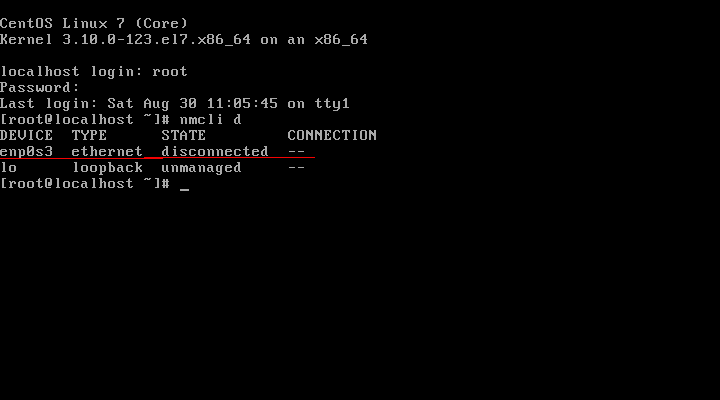
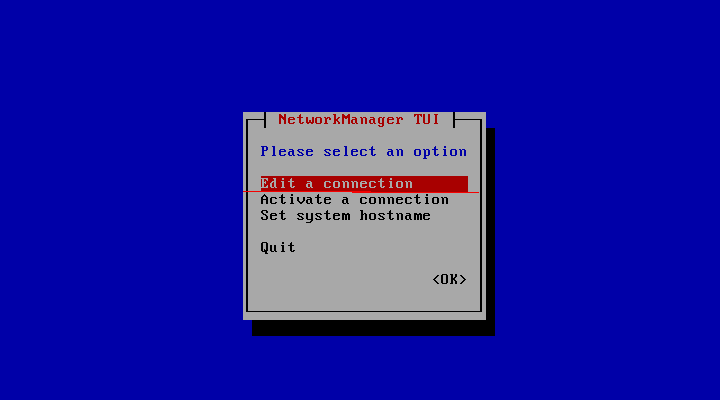
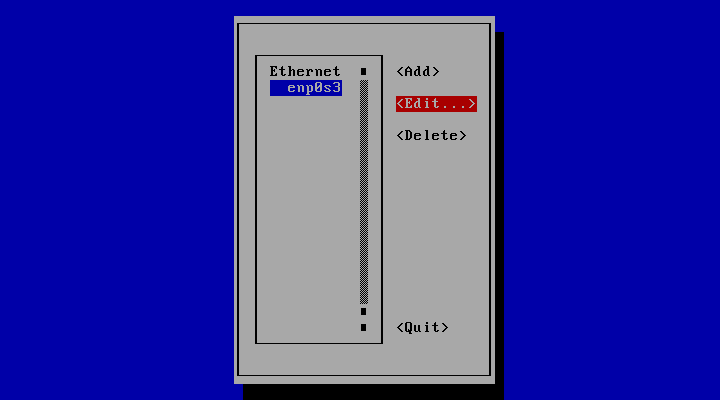
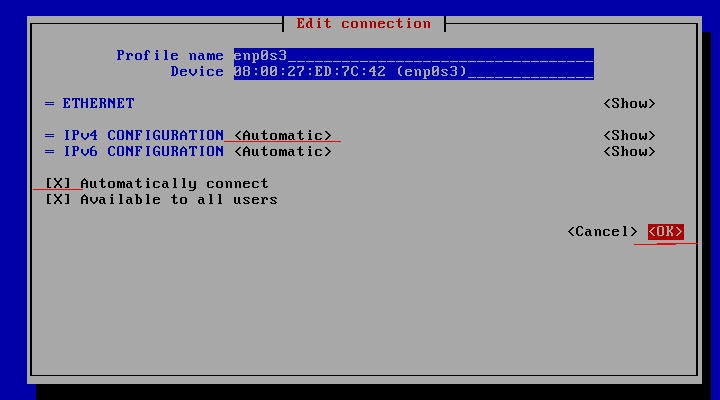
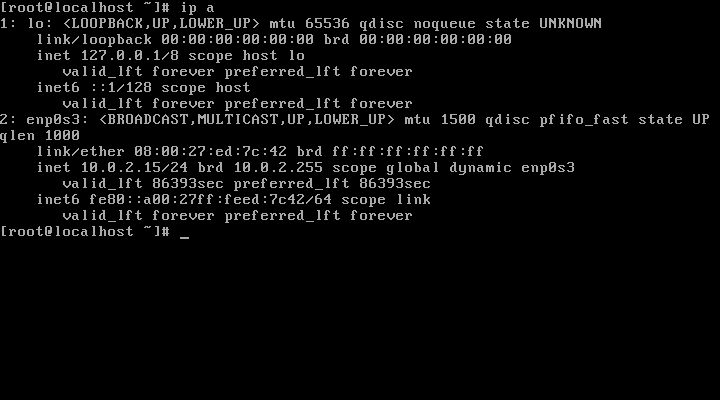
How to configure Static IP address
# vim /etc/sysconfig/network-scripts/ifcfg-eth0
## Default Configuration
DEVICE="eth0"
ONBOOT=yes
NETBOOT=yes
UUID="41171a6f-bce1-44de-8a6e-cf5e782f8bd6"
IPV6INIT=yes
BOOTPROTO=dhcp
HWADDR="00:08:a2:0a:ba:b8"
TYPE=Ethernet
NAME="eth0"
## Configuration for Static IP
HWADDR=00:08:A2:0A:BA:B8
TYPE=Ethernet
BOOTPROTO=static
# Server IP #
IPADDR=192.168.2.203
# Subnet #
PREFIX=24
# Set default gateway IP #
GATEWAY=192.168.2.254
# Set dns servers #
DNS1=192.168.2.254
DNS2=8.8.8.8
DNS3=8.8.4.4
DEFROUTE=yes
IPV4_FAILURE_FATAL=no
# Disable ipv6 #
IPV6INIT=no
NAME=eth0
# This is system specific and can be created using `uuidgen eth0` command #
UUID=41171a6f-bce1-44de-8a6e-cf5e782f8bd6
DEVICE=eth0
ONBOOT=yes
# Restart network interface
systemctl restart NetworkManager
# Verify new IP settings:
ip a s eth0
# Verify new routing settings:
ip r
# Verify DNS servers settings
cat /etc/resolv.conf
How to enable kernel modules
# Error message : "Your system does not seem to be set up to build kernel modules"
# Solution:
yum clean all
yum install gcc-c++
yum install kernel-devel
yum install kernel-headers